Wreckage!
Wreckage is a faster more tactical based chess game played on a larger board with 3 new pieces, Knights with additional stepping powers and a special stronger type of pawn.
The Dragon and Detonator start off on the a and j files while the Flying Guillotine and the 5 ninja pawns enter the game via drops.
The Dragon is an extremely mobile piece. It moves passively like a queen or knight, and possesses two contrasting capture modes: by advancing or withdrawing from the enemy in specific directions. (similar to the capture modes of the Advancer/Withdrawer in Rococo/Ultima games)
The Detonator too moves passively like a queen or knight, and uses a turn to capture all adjacent pieces without moving.
The Flying Guillotine is a flier that combines the capture and movement of the Flying Bomber and the Raptor (as found in Raptor Chess / Birds and Ninjas). A side can drop one Flying Guillotine into any empty square in the back rank. Dropping this piece counts as a turn and only one can be dropped by each side for the entire game
5 Ninja Pawns can also enter the game via drops. They enter via an empty space on the 2nd rank and they can be optionally pushed forward towards the center.
Wreckage also features flexible castling, faster pawns (and ninja pawns), and associated en-passant rules. (see pawn movement)
In this fast paced game, not only are the new pieces highly mobile and dangerous, but the Pawns and Ninja pawns are only 4 moves away from promoting!
Board Setup
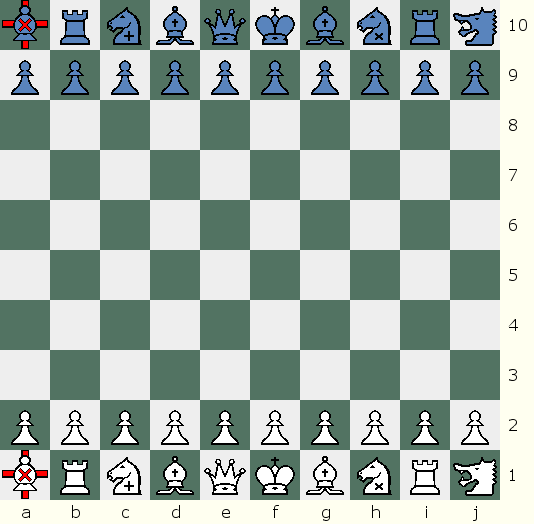 |
 




|
|
Wreckage Start position
Coordinates for white. (black mirrors white) Detonator on a1 Dragon on j1 Rooks on b1,i1 Wazir-Knight on c1 Ferz-Knight on h1 Bishops on d1, g1 Queen on e1 King on f1 Pawns from a2- j2 One Flying Guillotine to be dropped in empty space from a1-j1 5 Ninja Pawns to be dropped in empty space from a2-j2 |
 



 |
The Pieces
The standard pawn
Moves exactly as in standard chess except:The pawn can move from its original position either 1, 2 or 3 vacant squares forward.
If it previously moved only 1 space originally or captured from original position, it can move forward two spaces towards the center.
En-passant is logically applied to meet these changes.
From the middle (rank 5 for white, rank 6 for black), it can step only 1 space forward into the upper half of board, but from thereafter it can go one or two vacant spaces forward.
For example, a pawn can start at e2 push forward to e5 then make one step to e6 then go e8, and promote at e10 in 4 moves!
Note that if a pawn makes the two step pawn move and bypasses an enemy pawn, it can be captured en-passant.
see rules for more info.
The Ferz-Knight - moves like a knight or makes one step diagonally.
The Wazir-Knight - moves like a knight or makes one step orthogonally.
The Dragon


- It can move without capturing like a Queen or a Knight.
-
It can capture the enemy piece by approaching along an unobstructed path in forward directions N, NE and NW only and stopping one square short.
It is mandatory to make the capture if this move is carried out. - It can also capture by withdrawing 1 or more spaces away from an adjacent enemy piece along an unobstructed path in the directions S, E, W, SE and SW.
(Backwards and sideways).
It is mandatory to make the capture if this move is carried out i.e you cannot witdraw backwards and sideways from an enemy piece and not capture. - It CANNOT capture Pawns or Ninja Pawns under any circumstance.
- It NEVER captures by replacement.
- It can NEVER capture when jumping. It can only jump like a knight when not capturing.
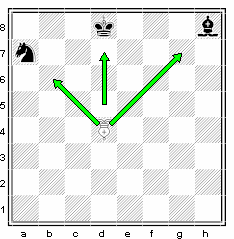
|
Here the Dragon can capture the bishop and knight by advancing towards them.
It is also checking the black king. |
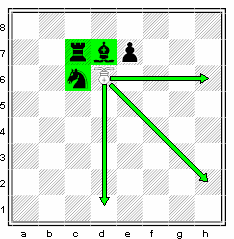 |
Here the Dragon can capture the rook, knight and bishop by withdrawing from them as shown.
It cannot capture the pawn by withdrawing. The Dragon can also slide like a queen or jump like a knight to any square without capturing. However capturing is not optional, i.e. in diagram it can only move without capturing along the line d6-a3. Or jump like a knight to any unoccupied space. |
The Detonator


- It can move without capturing like a Queen or a Knight.
-
It can capture all adjacent pieces without moving, and this detonation counts as 1 turn.
Note that it must either capture ALL adjacent pieces or none at all; there is no choice of which to capture.
The detonation counts as one turn. - It cannot capture Ninja Pawns. Note that it CAN detonate standard pawns.
- It cannot capture by replacement, and it never captures by moving.
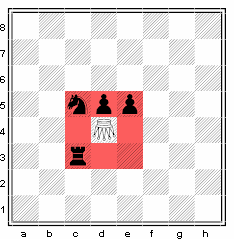 |
The Detonator shown can capture any piece on the red squares. It does not move when capturing. |
The Flying Guillotine

 The Flying Guillotine possesses multiple modes of movement and capture.
The Flying Guillotine possesses multiple modes of movement and capture.
- General Move: It can move along any clear orthogonal or diagonal path like a queen without capturing.
- General Capture: It captures by moving along an unobstructed line (orthogonal or diagonal) of zero or more spaces towards an enemy piece, and landing on the empty square just beyond it. There must be an empty square right after the enemy piece for the capture to take place.
- Special Move Mode: It can also jump over an adjacent piece (capturing if it is an enemy piece) to land 2 squares away.
Note that in this situation, it is limited to land just 2 squares away . - Special Capture Mode: It can also capture any piece that is exactly 2 squares away by landing on same square as enemy (capture by replacement).
It can carry out this special capture by sliding 2 spaces away or by jumping over a friendly piece. - Double Capture Mode: In case above if there is an enemy piece adjacent to it and another enemy piece on same line exactly 2 squares away,
it can capture both pieces by jumping over the first and landing on the square of the second piece.
Here too it is limited to land just 2 squares away only. - Choice of Capture Modes: Note that only when an enemy is 2 squares away does the Flying Guillotine ever capture by replacement, but it is under no obligation to do so. i.e. if the enemy piece is two spaces away from the Flying Guillotine and an empty space separates them and an empty space lies just beyond the enemy piece, the Flying Guillotine can either capture by replacement 2 squares away or capture by flying over and landing on the empty space just beyond.
- Dropping: One Flying Guillotine can be dropped by each side into an empty space on the back rank. The drop is considered a turn; must wait until next turn to move it.
-
Castling:
Unlike standard Chess, castling is flexible with the king able to travel 1, 2, 3, or 4 squares towards the rook.
There are 7 possible castling positions, the most extreme wing castling involves the king relocating to the b or i file. The choice of castling positions will depend on whether it is immediately necessary for the king to be tucked away at the wing or for the rook to be centralized.
The usual castling criteria apply: No piece can occupy the spaces travelled by the king and castling rook. Cannot castle out of check. King cannot pass over or land on squares attacked by enemy, but rook can.-
1 space transposition - King Side Castling
White moves King one space from f1-g1 and rook from i1-f1
Black moves King one space from f10-g10 and rook from i10-f10 -
1 space transposition - Queen Side Castling
White moves King one space from f1-e1 and rook from b1-f1
Black moves King one space from f10-e10 and rook from b10-f10 -
2 space transposition - King Side Castling
White moves King two spaces from f1-h1 and rook from i1-g1
Black moves King two spaces from f10-h10 and rook from i10-g10 -
2 space transposition - Queen Side Castling
White moves King two spaces from f1-d1 and rook from b1-e1
Black moves King two spaces from f10-d10 and rook from b10-e10 -
3 space transposition - King Side Castling
White moves King three spaces from f1-i1 and rook from i1-h1
Black moves King three spaces from f10-i10 and rook from i10-h10 -
3 space transposition - Queen Side Castling
White moves King three spaces from f1-c1 and rook from b1-d1
Black moves King three spaces from f10-c10 and rook from b10-d10 -
4 space transposition - Queen Side Castling
White moves King four spaces from f1-b1 and rook from b1-c1
Black moves King four spaces from f10-b10 and rook from b10-c10
Any other piece can occupy j1, j10, a10 or a1 during castling. -
1 space transposition - King Side Castling
- Fast Pawns: As described before, the Pawns can at any time move multiple spaces forward to reach the center. Then they can step forward just one step to enter enemy territory and thererefter move 1 or 2 spaces forward.
-
En-Passant:
A pawn can capture en-passant any enemy pawn that on the last move made multiple steps and bypassed it.
Ninja Pawns cannot be captured by En Passant nor can they capture En Passant. - Pawn promotion: Pawns or Ninja Pawns can now promote to: Queen, Bishop, Ferz Knight, Wazir Knight, Rook, Dragon, Flying Guillotine or Detonator. on the 10th rank only.
- Dropping: 5 Ninja Pawns and 1 Flying Guillotine can be dropped by either side during the turn.
Ninja pawns can dropped into any empty space on the second rank and make an optional forward thrust in the same turn.
The Flying Guillotine can be dropped into any empty space on the back rank, but it cannot be moved on the same turn.
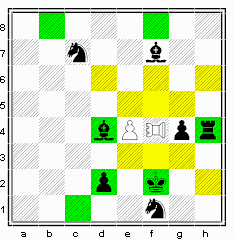 |
The Flying Guillotine on f4 is posing multiple threats.
It can capture by landing on the green squares and merely move to the squares in yellow. It can capture the knight at c7 by flying over to b8. It can capture the bishop at f7 by flying over to f8. It can also jump over the white pawn at e4 to capture the bishop at d4. It cannot travel beyond d4. It can also capture the pawn at g4 and the rook at h4 by flying over to h4. It must capture both in this case. Also it cannot go beyond h4 (the actual board goes up to the j file). The Flying Guillotine is checking the king at f2 since it is 2 squares away. If the king were to move, the knight at f1 would NOT be under attack since it is not 2 squares away and there is no empty square beyond it. Note that no piece can interpose to block the check if the king is 2 spaces away from the Flying Guillotine. It can capture the black pawn at d2 by moving to d2 or by flying over to c1. |
The Ninja Pawn


Movement:
The ninja pawn can always move 1 square up or 1 square sideways
to an empty square regardless of where it is situated on the board.
Thus White can on each turn move from e2-e3, e3-d3 and d3-d5.
From the middle exactly, (rank 5 for white, rank 6 for black), the ninja pawn can move only 1 square forward, but thereafter as soon as it enters enemy territory (the upper half of the board: White rank 6-10, and for black rank 5 - 1), the pawn can go forward either 1 OR 2 empty spaces.
Capture:
Like the standard pawn it can capture one square diagonally up, regardless of which half of the board it is on.
When the ninja pawn is on the top half of board (White rank 6 +, Black rank 5-) , it can also capture one square horizontally.
There is no en passant. It cannot capture another pawn or ninja pawn en passant nor can any other pawn capture it this way.
Promotion:
The ninja pawn promotes on the last row (rank 10 for white, rank 1 for black), to any piece. Promotion to a piece is mandatory so it would cease to be a pawn
in the last row.
Note that like the standard pawn, it can reach the promotion square from its start position in a minimum of 4 moves!
It cannot make a capture on the same turn as the drop.
Rules
The Invisible River / the thin red line and pawn/ninja pawn movement
In orthodox chess, the middle of the board is rank 4 for white and rank 5 for black. The pawns are allowed to reach the middle in one move and then just proceed one step at a time.Unlike Chinese Chess, there is no "River" but this middle is still significant.
In Wreckage the middle can be described as a thin red line or an invisible river, and crossing it results in a change for both ninja pawns and pawns. For starters, once they make the single step into enemy territory, the pawns can move forward one or two steps and threaten to promote very quickly. Additionally, the Ninja Pawns gain the ability to capture sideways.
Thus, it can be seen that the middle part of the board plays a very important part in a player's strategy, for crossing it leads to enhanced powers of both pawns and ninja pawns.
Wreckage Checkmate Problem
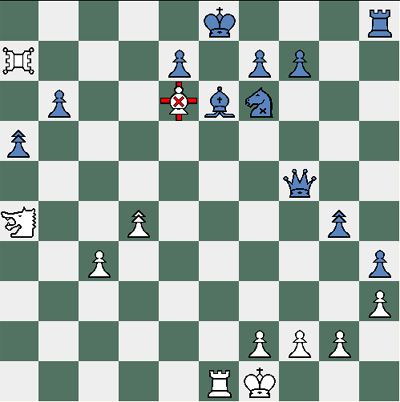
|
White can mate in 2 moves! |
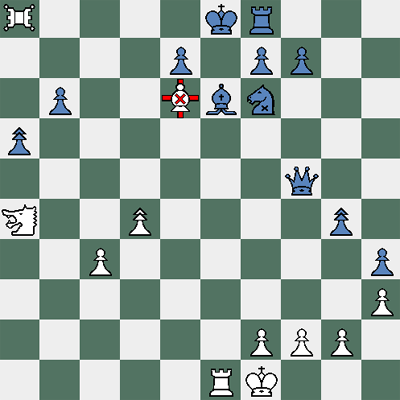
|
White moves Flying Guillotine from a9 to a10 check! Black's only defense, moving Rook from j10 to g10 to close the empty space beyond the king. |
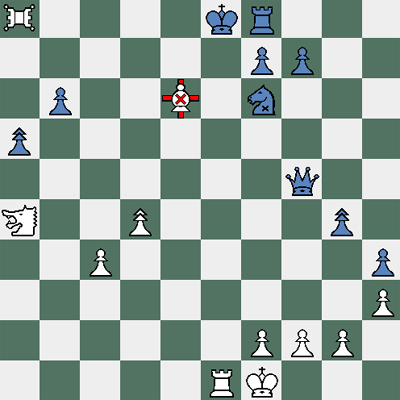 |
White finally detonates the adjacent pawn at e9 and the bishop at f8, exposing the attack from the rook
and the dragon.
Double Check and mate! |
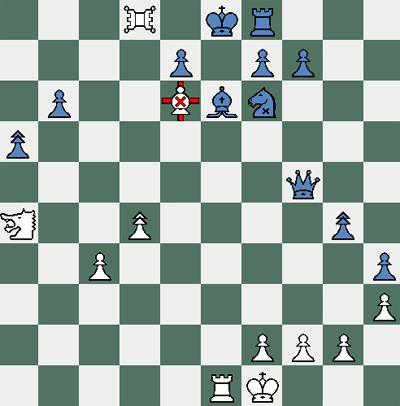 |
Alternatively White can also move the Flying Guillotine from a10 to d10. The king is 2 spaces away and so attacked even without an empty space beyond. It cannot approach the Flying Guillotine since that would create an empty space for it to be captured. It cannot go to f9 since the detonator will destroy it. So, CHECKMATE! And the detonator was not even detonated! Black chose to leave the king in the center rather than castling on the j side, and totally missed two huge threats: the detonation threat and the simple back rank check, thus inviting total devastation and wreckage! |
Play the Game!
Play Wreckage! (Free Registration at chessvariants.org required).View Game Logs for Wreckage
 Download Zillions of Games File
Download Zillions of Games File
|
If you would like to email the chess variant inventor directly: inventor@chess.computerwebservices.net
|
|
Posted by: karp on 2008-10-01 12:22:52 Like Chess: YES
Wow! Flying Guillotine! LOL! I must say these chess variants open up a whole new dimension of chess |

